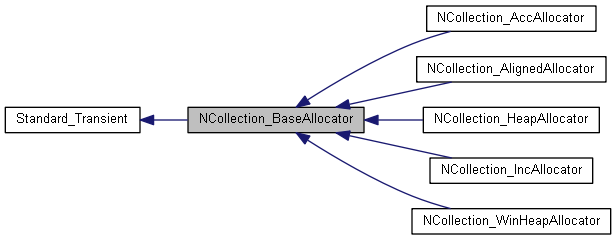#include <NCollection_BaseAllocator.hxx>

Public Member Functions | |
| virtual void * | Allocate (const size_t size) |
| virtual void | Free (void *anAddress) |
 Public Member Functions inherited from Standard_Transient Public Member Functions inherited from Standard_Transient | |
| Standard_Transient () | |
| Empty constructor. More... | |
| Standard_Transient (const Standard_Transient &) | |
| Copy constructor – does nothing. More... | |
| Standard_Transient & | operator= (const Standard_Transient &) |
| Assignment operator, needed to avoid copying reference counter. More... | |
| virtual | ~Standard_Transient () |
| Destructor must be virtual. More... | |
| virtual void | Delete () const |
| Memory deallocator for transient classes. More... | |
| virtual const opencascade::handle< Standard_Type > & | DynamicType () const |
| Returns a type descriptor about this object. More... | |
| Standard_Boolean | IsInstance (const opencascade::handle< Standard_Type > &theType) const |
| Returns a true value if this is an instance of Type. More... | |
| Standard_Boolean | IsInstance (const Standard_CString theTypeName) const |
| Returns a true value if this is an instance of TypeName. More... | |
| Standard_Boolean | IsKind (const opencascade::handle< Standard_Type > &theType) const |
| Returns true if this is an instance of Type or an instance of any class that inherits from Type. Note that multiple inheritance is not supported by OCCT RTTI mechanism. More... | |
| Standard_Boolean | IsKind (const Standard_CString theTypeName) const |
| Returns true if this is an instance of TypeName or an instance of any class that inherits from TypeName. Note that multiple inheritance is not supported by OCCT RTTI mechanism. More... | |
| Standard_Transient * | This () const |
| Returns non-const pointer to this object (like const_cast). For protection against creating handle to objects allocated in stack or call from constructor, it will raise exception Standard_ProgramError if reference counter is zero. More... | |
| Standard_Integer | GetRefCount () const |
| Get the reference counter of this object. More... | |
| void | IncrementRefCounter () const |
| Increments the reference counter of this object. More... | |
| Standard_Integer | DecrementRefCounter () const |
| Decrements the reference counter of this object; returns the decremented value. More... | |
Static Public Member Functions | |
| static const Handle< NCollection_BaseAllocator > & | CommonBaseAllocator (void) |
| CommonBaseAllocator This method is designed to have the only one BaseAllocator (to avoid useless copying of collections). However one can use operator new to create more BaseAllocators, but it is injurious. More... | |
| static void | StandardCallBack (const Standard_Boolean theIsAlloc, const Standard_Address theStorage, const Standard_Size theRoundSize, const Standard_Size theSize) |
| Callback function to register alloc/free calls. More... | |
| static void | PrintMemUsageStatistics () |
| Prints memory usage statistics cumulated by StandardCallBack. More... | |
 Static Public Member Functions inherited from Standard_Transient Static Public Member Functions inherited from Standard_Transient | |
| static const char * | get_type_name () |
| Returns a type descriptor about this object. More... | |
| static const opencascade::handle< Standard_Type > & | get_type_descriptor () |
| Returns type descriptor of Standard_Transient class. More... | |
Protected Member Functions | |
| NCollection_BaseAllocator (void) | |
| Constructor - prohibited. More... | |
Additional Inherited Members | |
 Public Types inherited from Standard_Transient Public Types inherited from Standard_Transient | |
| typedef void | base_type |
| Returns a type descriptor about this object. More... | |
Detailed Description
Purpose: Basic class for memory allocation wizards. Defines the interface for devising different allocators firstly to be used by collections of NCollection, though it it is not deferred. It allocates/frees the memory through Standard procedures, thus it is unnecessary (and sometimes injurious) to have more than one such allocator. To avoid creation of multiple objects the constructors were maid inaccessible. To create the BaseAllocator use the method CommonBaseAllocator. Note that this object is managed by Handle.
Constructor & Destructor Documentation
◆ NCollection_BaseAllocator()
|
inlineprotected |
Constructor - prohibited.
Member Function Documentation
◆ Allocate()
|
virtual |
◆ CommonBaseAllocator()
|
static |
CommonBaseAllocator This method is designed to have the only one BaseAllocator (to avoid useless copying of collections). However one can use operator new to create more BaseAllocators, but it is injurious.
◆ Free()
|
virtual |
◆ PrintMemUsageStatistics()
|
static |
Prints memory usage statistics cumulated by StandardCallBack.
◆ StandardCallBack()
|
static |
Callback function to register alloc/free calls.
The documentation for this class was generated from the following file:
 1.8.13
1.8.13